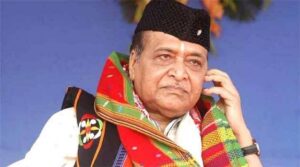Neiphiu Rio, the current Chief Minister of Nagaland, is a towering figure in Northeast India’s political landscape. As the longest-serving Chief Minister in the history of the state, his political career spans decades, filled with challenges, triumphs, and unwavering dedication to the Naga people. From his humble roots in Tuophema village to the helm of state leadership, Rio’s journey reflects a deep-rooted commitment to peace, cultural preservation, and sustainable development.
This blog explores the real-life story of Neiphiu Rio — his early years, political milestones, role in peace negotiations, developmental vision, and his enduring impact on Nagaland.
Early Life and Education: The Foundation of a Future Leader
Neiphiu Rio was born on November 11, 1950, in the picturesque village of Tuophema in Kohima district, Nagaland. He belongs to the Angami Naga tribe, one of the major tribes of the state known for its rich traditions and warrior heritage. Rio grew up in a closely-knit family rooted in Naga values and customs. His father, Late Guolhoulie Rio, was a well-known figure, and this early exposure to leadership and community responsibilities planted the seeds of political interest in young Rio.
He began his education at Baptist English School and later attended Sainik School, Purulia. After completing his schooling, he pursued his higher studies at St. Joseph’s College, Darjeeling, and eventually earned his Bachelor of Arts degree from Kohima Arts College, affiliated with North Eastern Hill University (NEHU), Shillong.
During his student life, Neiphiu Rio was actively involved in debates, youth programs, and cultural events. He served as the President of the Kohima District Students’ Union and other student organizations, building early experience in leadership and social engagement.
Stepping into Public Service: Youth and Grassroots Involvement
Before diving into active politics, Neiphiu Rio was involved in various social and community service initiatives. He served as the President of the Northern Angami Youth Organization and took part in initiatives for rural development, youth welfare, and sports promotion. His passion for youth empowerment led to his appointment as Chairman of the Nagaland Sports Council and Vice President of the Indian Olympic Association.
These formative years allowed him to build trust among the people, especially the youth, and laid the foundation for his future political career. His early roles helped him understand the needs of rural communities, the challenges of ethnic diversity, and the importance of preserving traditional culture while promoting development.
Political Debut: From Congress to Regional Leadership
Neiphiu Rio entered active politics as a member of the Indian National Congress (INC). In 1989, he was elected as a Member of the Nagaland Legislative Assembly (MLA) from Northern Angami-II constituency. Over the years, he held several ministerial portfolios, including Sports and School Education, Higher and Technical Education, and Art and Culture.
However, his growing dissatisfaction with the Congress’s approach to the Naga political issue led to ideological differences. Rio firmly believed in a political solution to the Naga insurgency and peace through dialogue, whereas the central leadership often failed to address the issue with urgency and depth.
In a bold political move, he resigned from the Congress in 2002 and joined the Naga People’s Front (NPF). He soon emerged as a popular leader who resonated with the aspirations of the Naga people.
Becoming Chief Minister: A Turning Point in Nagaland’s Political History
In 2003, Neiphiu Rio led the Democratic Alliance of Nagaland (DAN), a coalition of regional and national parties, to a historic victory, ending Congress’s long-standing rule. At the age of 53, he was sworn in as the 9th Chief Minister of Nagaland, marking the beginning of a new era.
This victory was more than a political change — it was a shift in how the state approached governance, identity, and peace. Under Rio’s leadership, the state government prioritized:
- Political dialogue for permanent peace
- Economic development and infrastructure
- Youth empowerment and employment
- Promotion of Naga culture and identity
Championing the Naga Peace Process
One of Neiphiu Rio’s most significant contributions has been his role as a mediator and advocate for the Naga peace process. He has consistently maintained that the decades-old conflict in Nagaland must be resolved through an inclusive, peaceful, and honorable political solution.
Rio was instrumental in building a peaceful atmosphere for talks between the Government of India and Naga groups, including the NSCN (IM). His government supported the Framework Agreement signed in 2015, and he continues to push for unity among different Naga factions to ensure a lasting resolution.
In a politically sensitive state like Nagaland, Rio’s balanced approach has earned him admiration from both the public and political observers.
Promoting Culture and the Iconic Hornbill Festival
Neiphiu Rio’s leadership has also transformed Nagaland into a cultural tourism hub, with the Hornbill Festival being a standout achievement. Often called the “Festival of Festivals,” it showcases the rich heritage, tribal traditions, music, dance, and cuisine of the Naga people.
First launched in 2000, the Hornbill Festival gained international recognition during Rio’s tenure. Today, it attracts visitors from around the globe and boosts the local economy, tourism, and cultural pride. Rio’s efforts in branding the state as a cultural destination have placed Nagaland on the global map.
Focus on Youth, Education, and Skill Development
Neiphiu Rio has been a strong advocate for quality education, entrepreneurship, and skill-building initiatives among the youth of Nagaland. He has supported the establishment of technical institutes, vocational training centers, and scholarship programs.
Under his leadership, initiatives like Startup Nagaland, Nagaland Innovation Expo, and skill development schemes have given young entrepreneurs a platform to innovate and grow. Rio believes that empowered youth are the key to long-term peace and prosperity in the region.
Infrastructure and Connectivity: Building a Modern Nagaland
Despite the state’s challenging terrain, Neiphiu Rio has consistently pushed for better infrastructure, healthcare, connectivity, and digital access. His administration has facilitated:
- Widening of highways and rural roads
- Improvement in healthcare services and hospitals
- Expansion of power supply and water services
- Introduction of e-governance and digital literacy
He also envisions transforming Kohima and other towns into smart and sustainable urban centers, all while protecting the environment and indigenous practices.
Political Longevity: Adaptability and Strategic Alliances
Neiphiu Rio is known for his political adaptability and strategic insight. After leaving the NPF, he founded the Nationalist Democratic Progressive Party (NDPP) in 2017, and allied with the Bharatiya Janata Party (BJP). In the 2018 Assembly Elections, the NDPP-BJP alliance secured a majority, and Rio returned as Chief Minister.
He repeated this success in 2023, making him the only Chief Minister in Nagaland to serve five terms. His long tenure is a reflection of public trust and his ability to form consensus across party lines and tribal groups.
Awards, Recognition, and Personal Life
Neiphiu Rio has received several awards, including:
- Mother Teresa Millennium Award for political leadership
- Honored by cultural and peace organizations for promoting harmony
Between 2014 and 2018, he also served as Member of Parliament (Lok Sabha) from Nagaland, further expanding his experience at the national level.
He is married to Kaisa Rio, and they have six children. Despite his busy political career, Rio remains deeply connected to his roots and actively participates in traditional festivals, church programs, and village events.
Conclusion: Neiphiu Rio’s Enduring Legacy in Nagaland
Neiphiu Rio’s real-life journey is a testament to vision, resilience, and service. As the face of Nagaland’s political awakening, he has championed peace, cultural pride, and inclusive growth. Whether it’s through diplomacy, developmental projects, or youth empowerment, Rio has consistently put the interests of the Naga people first.
His name is now etched in the political history of Nagaland — not just as a leader but as a statesman who transformed challenges into opportunities. As Nagaland continues to march toward a hopeful future, Neiphiu Rio remains its guiding force — blending tradition with modernity, and leading with wisdom and heart.






